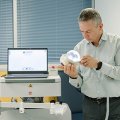
Churches are good for the health of Christians but less therapeutic for atheists.
This is a key finding of a recent study by Professor Alex Haslam of The University of Queensland School of Psychology and colleagues at Carleton University, Canada, and the University of Exeter, UK.
“We looked at Christians’ and atheists’ self-esteem and self-reported physical health when immersed in a cathedral rather than in other environments,” Professor Haslam said.
“Christians reported better health when immersed in the cathedral, while atheists reported better health when disengaged from a religious place.
“The results suggest that immersion in space that reflects one’s own religious beliefs and identity has positive consequences for health and well-being.”
The research consisted of two investigations, the first involving 97 participants at three locations in Exeter – a cathedral, a castle, and a shopping centre.
Participants were asked to respond to statements such as ‘I am pleased with my appearance right now’ and ‘I am worried about what other people think of me’.
Researchers also collected demographic information about participants, including their religion, but this was not an obvious focus of the questionnaire.
The second investigation, involving 124 participants, saw an equal number of Christians and atheists assigned to be ‘virtual tourists’ in three locations – a cathedral, a mosque and a museum.
Some participants experienced locations through virtual reality goggles, while others viewed a video on a computer screen, prior to being quizzed about their physical and psychological health.
Professor Haslam and co-authors Dr Renate Ysseldyk and Dr Thomas Morton said the study provided important insights into the way health is impacted by physical space.
“Where we are affects how we feel – particularly when we are in places that reflect who we are and who we are not,” Professor Haslam said.
“Although such effects are often dismissed as inconsequential, present research suggests that these may be experienced, and have consequences, at a much deeper level than previously thought.
“For the Christians in our research, there was evidence immersion in identity-affirming religious spaces led to marked improvements in their psychological and physical health.
“More generally, this research points to important connections between space, identity and health that have profound implications for the way we manage space and the way we promote well-being.”
The study has been published in the Journal of Environmental Psychology.
Media: Professor Alex Haslam, a.haslam@uq.edu.au , +61 7 3346 7345. Robert Burgin, UQ Communications, r.burgin@uq.edu.au, +61 7 3346 3035, +61 448 410 364.












